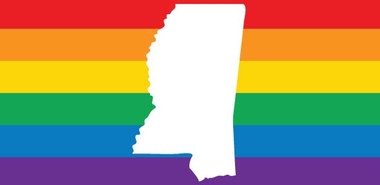Mississippi asks court to uphold law affecting LGBT rights

JACKSON, Miss. (AP) — Mississippi's Republican governor is asking a federal appeals court to uphold a state law letting merchants and government employees cite religious beliefs to deny services to same-sex couples.
U.S. District Judge Carlton Reeves blocked the "religious objections" law moments before it was to take effect July 1, ruling that it unconstitutionally establishes preferred beliefs and creates unequal treatment for lesbian, gay, bisexual and transgender people.
The law championed and signed by Gov. Phil Bryant sought to protect three beliefs: Marriage is only between a man and a woman; sex should only take place in such a marriage; and a person's gender is determined at birth and cannot be altered.
Mississippi Democratic Attorney General Jim Hood declined to appeal Reeves' ruling. The governor's appeal is instead being handled by private attorneys, including some working for Alliance Defending Freedom, an Arizona-based Christian legal group that helped write the measure. Bryant signed it into law last April.
The law "gives the opponents of same-sex marriage the same conscientious-objector protections that federal law confers on the opponents of warfare, abortion, capital punishment and physician-assisted suicide," attorneys for the governor wrote in arguments filed Wednesday at the 5th U.S. Circuit Court of Appeals.
The law would have allowed clerks to cite religious objections to recuse themselves from issuing marriage licenses to same-sex couples, and would have protected merchants who refuse services to LGBT people. It could have affected adoptions and foster care, business practices and school bathroom policies.
More than 100 bills were filed in more than 20 state legislatures across the nation in response to the June 2015 U.S. Supreme Court ruling legalizing gay marriage, UCLA law professor Douglas NeJaime testified before Reeves in June. NeJaime said Mississippi was the only state to enact a law listing specific beliefs to be protected.
The Mississippi law was supported by Baptist and Pentecostal groups in the state, and the Washington-based Family Research Council gave Bryant an award for signing it. Opponents protested outside the Governor's Mansion in Jackson and executives of several large companies, including Coca-Cola Co. and Northrop Grumman Corp., called the law as discriminatory and said legislators should repeal it. Multiple lawsuits from gay rights supporters sought to overturn the law.
Copyright: Associated Press, The Gayly - 11-21-2016 @ 11:21 a.m.





